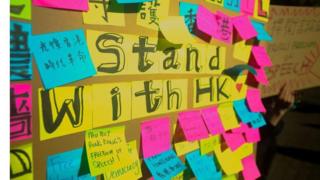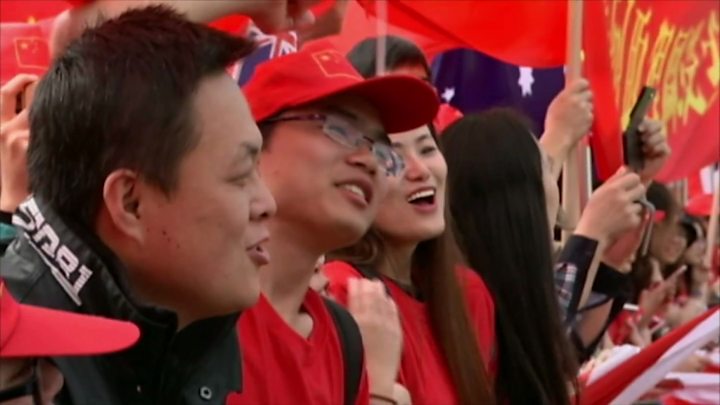Home » Australasia »
‘I’m in Australia but I feel censored by Chinese students’
Hong Kong is now in its eighth week of street protests, which began with opposition to a controversial extradition bill but have spiralled into wider opposition to the government and Beijing.
As the situation grows yet more tense, the impact is also being felt overseas, particularly among the hundreds of thousands of mainland Chinese and Hong Kong students studying in Australia.
At the University of Queensland, the tensions spilled over into violent clashes last week, when a group staging a support rally for the Hong Kong demonstrators were confronted by pro-Beijing protesters.
Hundreds of protesters faced off against each other, yelling insults and abuse as the Chinese national anthem was blasted from a speaker.
Videos posted online showed pro-China supporters ripping posters from the hands of opponents, prompting shoving and physical confrontations.
Security officials quickly arrived to separate the groups but tensions remained high, said Nilsson Jones, a student journalist who filmed some of the clashes.
“Overwhelmingly, the [mainland] Chinese students were the aggressors,” he said, adding that they had also turned out in greater numbers.
Hong Kong students who took part in the protests told the BBC they had done nothing to incite that response. Christy Leung, 21, and Phoebe Fan, 22, said they had helped organise a peaceful demonstration to support the pro-democracy protests at home.
“Our goal was for us to show support for the Hong Kong protesters, and to show we’re against the extradition bill to China,” Ms Fan told the BBC. “We didn’t say anything about independence or anything like that.”
The students said their protest began smoothly but they were later surrounded by counter-protesters who heckled them and began to destroy their signs.
Ms Leung said she was confronted by one man who “came at me and slammed the poster out of my hand”. She added: “Some of my male friends moved to get in front of me and to stop him, but I felt like he was trying to hurt me. He choked one of the guys in the fight.”
Earlier in the day, a separate protest led by Australian students voiced its support for the Hong Kong protest movement, as well as criticising China’s treatment of ethnic Uighurs. But that event also saw heated confrontations with counter-protesters.
One Australian student, Drew Pavlou, said he was left with a chipped tooth and bruising to his ribs after one clash. He said he had since received death threats online and has had to be accompanied by a security guard to classes.
‘I feel scared’
Ms Fan and Ms Leung say such harassment has also continued off campus. They have found pictures of themselves being shared on Chinese social media sites next to threatening messages. Ms Fan said one comment warned she would “face consequences”.
One of their friends was also “doxxed” – personal information including his passport, marriage certificate and student ID details were posted online. “Don’t worry, there won’t be a peaceful life for him in Brisbane,” read an accompanying caption on Chinese social media platform Weibo.
“I’m feeling very disturbed and mostly scared because I’m not sure what they’re going to do to me,” Ms Fan said. However, she still plans on attending further protests.
The University of Queensland did not speak directly about Ms Fan’s concerns, but said it was investigating the protests and had offered support to students. “The university is committed to protecting freedom of speech, and has zero tolerance for violence and intimidation,” a spokeswoman said.
What do counter-protesters say?
One counter-protest leader, Frank Wang, did not respond to the BBC’s requests for comment but told local media that he had warned opponents that a “conflict [was] definitely going to happen” last Wednesday.
“The thing that happened today is not about us,” he told the Australian Broadcasting Corporation last Wednesday. “They held the event, they caused everything… they tried to make us angry.”
An online petition demanding the university apologise for allowing the pro-democracy protests to be held has received more than 3,000 signatures.
Other posts on social media appear to suggest that tensions have spread to other universities. One showed the destruction of a pro-democracy message board at the University of New South Wales in Sydney.
There were also reports on Tuesday of similar scuffles at a university in Auckland, New Zealand.
‘Spontaneously patriotic’
There are just under 200,000 Chinese students in Australia who, like in many countries, bring in valuable revenue for the academic sector.
But there has been growing concern in recent years over how much visiting Chinese students are influenced by the government in Beijing.
The Australian government is already investigating the role of Confucius Institutes – Chinese language and cultural centres funded by the Chinese government – in relation to new laws which require foreign organisations to be “open, lawful and transparent”.
After the Queensland clashes, China’s consul-general in Brisbane, Xu Jie, insisted that the mainland students were being “spontaneously patriotic”.
And it is unclear whether such fervour is being directed by state authorities, say China analysts in Australia.
“I think there is enough patriotism and pride among Chinese students that these kinds of things are going to happen frequently, even without government direction,” said Dirk Van der Kley of China Matters, a Sydney-based think tank.
Australian Foreign Minister Marise Payne has responded by reiterating that freedom of speech is protected in Australia.
“The government would be particularly concerned if any foreign diplomatic mission were to act in ways that could undermine such rights, including by encouraging disruptive or potentially violent behaviour,” she said.
Another protest is scheduled to take place at the University of Queensland on Wednesday, accusing the institution of failing to protect free speech on campus. University officials have said student safety is their top priority. Participants have been asked to carry student ID cards and warned that they may have to remove face coverings.
Ms Fan told the BBC she wanted the pro-China students to “respect our right to free speech”.
But she said she was angry that the pressure had reached her “on Australian soil”, and that she feared she was being monitored.
“I feel powerless and mostly scared,” she said. “I still have to study here, and now they’re spying on me.
“I’m trapped. There are words I want to say, but with everything I self-censor. I feel a lack of freedom to express myself.”
Source: Read Full Article




